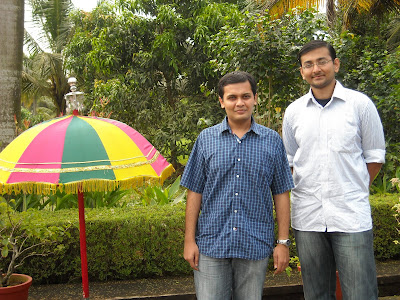
COLUMN: PASSING BY
Harsh Ketkar and Amrutanshu Mishra, two bright students of the Indian Institute of Management (Calcutta), talk about their experiences in the august institution, while on a brief visit to Kochi
Photo: Harsh Ketkar (left) and Amrutanshu Mishra
By Shevlin Sebastian
To get into an Indian Institute of Management (IIM) is tough. Here are the odds: out of 2.5 lakh candidates who sit for the Common Admission Test, only 1500 are selected. That is the top 1 per cent. Harsh Ketkar and Amrutanshu Mishra are two such students.
Today, they are in the second year in IIM (Calcutta) and had come to Kochi to take part in a national business quiz organised by the Rajagiri Centre for Business Studies.
“Of course, it was a feeling of elation, when I got through, knowing how tough the competition was,” says Harsh. Interestingly, the male-female ratio is lop-sided. There are only 10 per cent girls in IIM (Calcutta). “But the girls who have gained admission are really good,” he says.
For Harsh and Amrutanshu, studying in IIM was an eye-opener. “During the classes there are a lot of discussions,” says Amrutanshu. “Since most of the talk is based on cases, we are expected to study them beforehand, and express our opinions.”
Harsh remembers a case study that was taken up recently: the E-Chopal initiative by the blue-riband Indian Tobacco Company. “They eliminated the middle man between the farmer and the market for the procurement of soybeans, wheat, and coffee,” he says. “In this way, the company got a better quality of produce, while the farmers got a good price. It has been a great success and is a case study in Harvard Business School.”
Of course, like in all institutions of higher learning, the pressure to do well is enormous. “The academic stress is 15 times higher than when we were doing an engineering degree,” says Amrutanshu. “Each course requires hundreds of hours of preparation.”
In fact the typical daily ratio is 3: 7. That is three hours of classes followed by seven hours of preparation. “We spend a lot of time in the library and at our rooms where there is a Wi-Fi internet connection,” says Harsh. “We are able to get access to world-class databases through the IIM network and download a lot of research papers.” Usually they study late into the night. “It is quieter and the concentration levels are higher,” he says.
Both smile and shake their heads, when asked whether the atmosphere is as bad as described by author Chetan Bhagat in his book, 'Five Point Someone', about life in the Indian Institute of Technology.
“We have a co-operative environment,” says Harsh. “In the week before the exam, seniors who have done well in the subject conduct classes for us.” Says Amrutanshu: “Most of the students who come to IIM have already undergone numerous tests and stressful exams before. So, they know how to handle the pressure.”
One striking difference which they noticed that was that in the examinations, learning by memory would not work. “All questions are application-based,” says Amrutanshu. “You have to analyse and deduce, to get the answers.”
What compensates for the tough schedule are the interesting people they have met. For Harsh, it was India's leading car designer Dilip Chhabria, who had come to give a talk. Harsh had gone to collect Chhabria from the hotel. “I knew that he was an immensely talented designer,” says Harsh. “But what struck me was his business acumen.”
Auto design not only has to be aesthetically pleasing, it should be feasible in an engineering way. There are regulatory constraints, like a fixed length for a car.
“Chabria told me that these compulsions made auto design interesting and challenging,” says Harsh. “I gained a lot in my interaction with him.”
For Amrutanshu, it is faculty professor Rahul Mukerjee, one of India’s best statisticians, and the recipient of the Shanti Swarup Bhatnagar award in mathematical sciences in 2000.
“Whenever he comes to class, he gives the impression that it is a new day for him,” he says. “The sheer effort he puts in so that each and every student understands the lesson is amazing. And his greatest quality is his humility. It is a pleasure interacting with him.”
Asked for their plans, post-graduation, Amrutanshu wants to work for a company that will provide a good income and give scope for growth. Harsh says, “Learning is the single biggest parameter for me to join a company.”
Both came across as intelligent and intense, and undoubtedly, like so many of their colleagues, will become assets to the nation in the near future.
(The New Indian Express, Kochi)
src="http://www.statcounter.com/counter/counter_xhtml.js">
Hey Sebastian, please try our new Business Quiz and suggest us improvements based on your journalistic expetience. Please do it for us
ReplyDelete